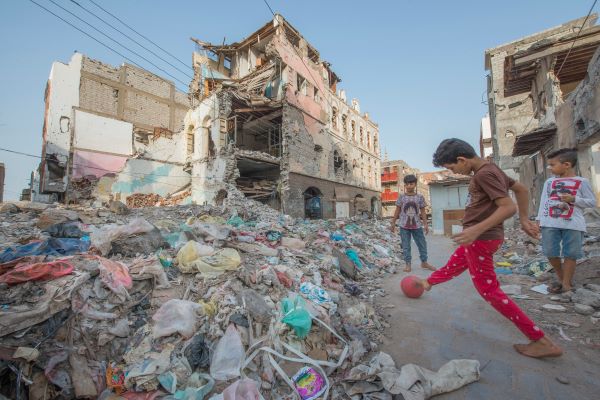~ 21 September 2023 ~
Yemen is in a state of no war, and no peace. Although that is certainly better than brutal conflict, unfortunately, an “unofficial” ceasefire is a status that is not sustainable. There has been a heavy focus on diplomatic efforts to end the eight-year conflict and seal an agreement between warring parties: Saudi Arabia, and Yemen’s Houthi rebels. But sealing a lasting ceasefire or negotiating an end to the conflict has not materialized. All the while, the country continues to deteriorate, and the humanitarian crisis worsens.
Long Road of Conflict
In 2010, the Arab Spring uprisings moved throughout the MENA, including Tunisia, Libya, Egypt, Syria, and Bahrain, and later reached out to other regions. The protests brought pro-democracy hope to Yemen. As a result of the uprisings and pressure from external forces, then-President Ali Abdallah Saleh resigned, and Vice President Abdrabbuh Mansour Hadi became president. However, many Yemenis were quickly disillusioned with the new government and demanded elections.
The Houthi movement took advantage of the dysfunction and protests and gained control of the northern region of the Saada province, and neighboring areas. In late 2014, the Houthi rebels seized the capital of Sanaa in a coup. In the midst of disorder and chaos, President Hadi fled to Saudi Arabia. Concerned there would be a regional shift, Saudi Arabia intervened on behalf of the Yemeni government.
Since early 2015, Yemen has been enmeshed in conflict. Saudi Arabia, with support from the US, France, the UK, and nine other Arab states, launched an air campaign against Yemen. The US, France, and the UK consistently sold munitions, machinery, and maintenance to Saudi Arabia in the amount of hundreds of billions of dollars, for it to carry out its mission. The Saudi-led coalition began an indiscriminate bombing and artillery strike that has largely targeted civilians, residential neighborhoods, healthcare and education systems, markets, religious centers, and infrastructure. In 2018, the coalition bombed a school bus filled with children, killing 26 and injuring 19. And while many claimed outrage, it was not enough to stop selling arms, or pressure warring parties to stop the fighting.
To be clear, both the Houthi and the coalition forces have knowingly attacked civilian targets in violation of international humanitarian law. Torture, arbitrary arrests, and forced disappearances are among the alleged war crimes perpetrated by both sides.
Outside Influences
The complexity of Yemen’s conflict is no longer just Saudi-backed government forces versus the Houthi rebels. A myriad of forces are in competition for influence or power. These power struggles dictate the outcomes for millions of Yemenis. One of those forces is Iran. The Saudi Government has consistently promoted a narrative that Houthi rebels are supported by Iran both with arms and finances. However, it has been determined and is largely accepted, that Iran’s influence is likely limited. It is also understood that the majority of Houthi armaments are gleaned from the black market and that the Houthi are financially independent from Iran.
Working for Peace
UN-backed peace negotiations have made limited progress. The 2018 Stockholm Agreement averted a battle for the port city of Hodeidah, but the accord’s provisions were never completed. Peace efforts gained momentum again in 2022 when President Hadi ceded power to a governing council that helped to consolidate anti-Houthi forces. Hadi went the extra mile and removed a deputy reviled by the Houthi, in the hopes they would return to the negotiating table. That has not happened.
The UN brokered a ceasefire in mid-2022, however after six months, the combatants failed to renew the deal, hence the status of no war, no peace. Discussions, once again, reignited hopes for another ceasefire, but the exclusion of the governing council from the talks raised questions about the possibilities for peace. As we learned in Afghanistan, when the government is excluded from peace talks… it may lead to something far worse.
The Humanitarian Crisis
The humanitarian crisis in Yemen is a disaster. The Saudi-led coalition has frequently closed off all access to the country, closing Yemen off from the outside world, and restricting even humanitarian aid. After eight years of land, sea, and air blockades by coalition forces, the flow of vital supplies, food, and medicine led to an increase in the cost of essential goods, worsening the situation. Food prices have soared. People cannot afford to eat.
The UN estimates at least 370,000 people have died since the start of the conflict. It also states that the number is probably considerably higher in reality. Some 60 percent of deaths are indirect causes such as starvation, lack of water, and inadequate health services. Approximately 80 percent, some 26.1 million Yemenis remain in need of assistance. An estimated 17.4 million are experiencing hunger and malnutrition. At least 85,000 children have died of malnutrition since 2015.
One of the fastest-growing concerns in Yemen is that there have been multiple outbreaks of vaccine-preventable diseases including measles, tetanus, diphtheria, and whooping cough. There were 22,000 cases of measles in 2022. Millions of children lack access to safe water, sanitation, and hygiene services. A cholera outbreak has affected over 2.5 million people.
People continue to flee violence. More than 4.5 million have been displaced from their homes, and many have experienced multiple displacements. And the overwhelming majority of displacements are internal. All sides of the conflict are reported to have violated human rights and international humanitarian law.
Humanitarian Aid Saves Lives
Yemen is now competing for limited resources available alongside Ukraine, Syria, and Sudan, as well as many countries experiencing a crisis due to climate crisis, which has produced large numbers of displaced populations and refugees. Despite the conflict, Yemen hosts 137,000 refugees and asylum seekers from Somalia and Ethiopia, making Yemen the world’s second-largest host of Somali refugees.
In January 2022, the UN was forced to reduce food rations for some 8 million Yemenis due to a lack of funding. In January 2023, the UN health group made the difficult decision to cut its provisions of incentives, including pay for health workers in Yemen by 60 percent due to a decrease in funding for the country. Countries are simply not honoring their promised commitments to Yemen.
These are real, human stories filled with personal tragedy. It is heartbreaking to look a family in the face and tell them that you can’t help them because there is no funding. Crises are increasing and resources are decreasing. The world has never been richer than it is right now. We live on a planet where there is more than enough to eat. That there is hunger is senseless. Humanitarian aid saves lives. It’s not a question of will. The will to help is there. The problem is that there is more need than there is money in the programs to help. Countries need to honor their commitments.
Stories from Yemen: A Diary from the Field
Between 2018 and 2021, my team and I spent 17 months on the ground in Yemen investigating human rights violations. What we experienced was deeply troubling and heartbreaking, but being able to help people in their moments of suffering was also very rewarding. There was hope in the faces of the people we met in Yemen; hope that they would not be forgotten and hope that the conflict would end. The Yemeni people are experiencing something beyond their control, through no fault of their own. They deserve to be helped and their stories deserve to be heard.
Stories from Yemen: A Diary from the Field is available through Ingram publishers, Amazon, Barnes and Noble, and independent booksellers everywhere. I hope you will discover Yemen through these stories.
With gratitude… Lara
Photo Credit: “Yemen: responding to the world’s largest humanitarian crisis” by EU Civil Protection and Humanitarian Aid. Licensed under CC by NC ND 2.0
#ThinkingOutLoud #TOL #larakajs #Yemen #conflict #humanitarian #StoriesfromYemen


As conflicts and crises have increased around the world, the situation in Yemen (and Syria) has been swept aside in the prioritization of aid. We have not forgotten the Yemeni people. We will continue to push for conflict resolution and for the appropriate aid to be given.
Yemen: No War and No Peace picks up where Lara Kajs’ book, Stories from Yemen: A Diary from the Field leaves off. The situation is precarious. The need for resolution is immediate. Until there is a close to the conflict, Yemen will not be able to move on.
In her most recent piece on the situation in #yemen Lara Kajs revisits how the embattled country’s trauma led it to be the world’s worst #humanitariancrisis. #Ukraine grabs the media attention… but Yemen is still at the front of need. Financial commitments have been cut… but that does not change the fact that the need is there. This piece is an excellent epilogue to her book, Stories from Yemen: A Diary from the Field.
Yemen: No War, No Peace, really sums up what has been happening in the war-torn country for the past 8 years. The tragedy is that there are so many crises happening now… that countries like Syria and Yemen are losing their audience… and all of these crises are competing for resources, aid, and care.
The humanitarian crisis in Yemen is a disaster. The Saudi-led coalition has frequently closed off all access to the country, closing Yemen off from the outside world, and restricting even humanitarian aid. After eight years of land, sea, and air blockades by coalition forces, the flow of vital supplies, food, and medicine led to an increase in the cost of essential goods, worsening the situation. Food prices have soared. People cannot afford to eat.